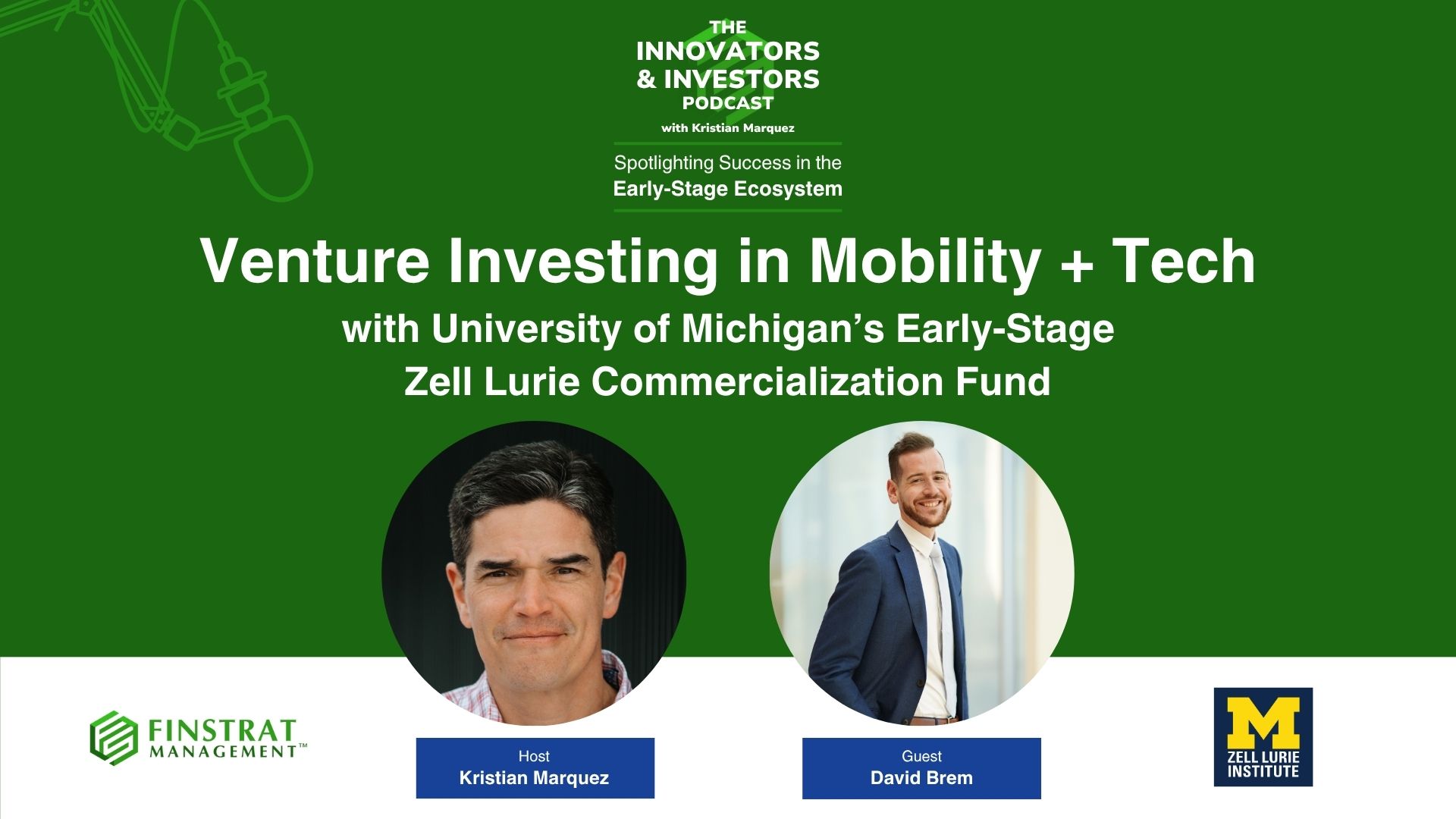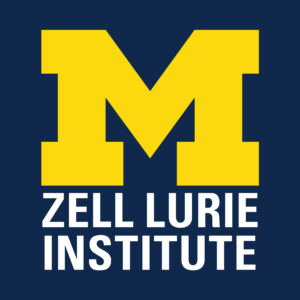Venture Investing with University of Michigan’s Early-Stage Zell Lurie Commercialization Fund
June 23, 2025 | 39 MIN

Highlights
- David Brem leads a student-run, sector-agnostic early-stage fund focused on Michigan’s vibrant entrepreneurial ecosystem.
- He bridges global venture ecosystems spanning the U.S., Europe, and Australia, promoting cross-border founder and VC connections.
- Mobility tech, especially eVTOLs and related infrastructure, is a prime investment focus due to transformational potential over the next 15 years.
- Zell Lurie Commercialization Fund invests qualitatively, emphasizing team and founder engagement over revenue in pre-seed/seed stages.
- The fund’s value proposition extends beyond capital, providing alumni networks, advisory support, and institutional resources.
- David’s diverse background—from Marine Corps intelligence to management consulting—informs his deep interest in travel, tech, and aerospace investments.
- Advice to aspiring investors and founders: expand your network, be purposeful but explorative, and add value to others to unlock opportunities.
Summary
This episode of the Innovators and Investors podcast, hosted by Kristian Marquez, features David Brem, a dynamic figure actively engaged in multiple venture capital and startup ecosystems. David is the Managing Director of the Zell Lurie Commercialization Fund (ZLCF) at the University of Michigan, an MBA investment associate at Electro Ventures, a research associate at the London Venture Capital Network, and a senior venture scout at Level Up Ventures. The dialogue centers around David’s background, his various roles, and his focus on early-stage investing, particularly in mobility tech, including emerging areas like eVTOLs (electric vertical takeoff and landing vehicles) and infrastructure that supports new aviation technologies.
David shares insights about ZLCF’s unique student-led, sector-agnostic fund focused primarily on Michigan-connected founders but progressively expanding to broader geographies and sectors. Their investment process emphasizes qualitative founder-first analysis, prioritizing the team, product, business model, and market with a low-risk appetite and small check sizes (~$50K). He explains how the fund involves a team of students from diverse academic backgrounds who conduct due diligence and support portfolio companies, offering a collaborative and broad perspective in decision-making.
David’s passion for mobility stems from his Marine Corps intelligence background and subsequent consulting experience in aerospace and travel tech. He highlights the enormous potential of mobility technologies and their ecosystems, drawing parallels between the competitive landscape of eVTOL manufacturers and the vaccine market, emphasizing infrastructure and adjacent technologies as underexplored investment opportunities.
Beyond investment, David acts as a connector, bridging global startup ecosystems—particularly between the U.S., Europe, and Australia—and facilitating interactions among founders and VCs to foster innovation and deal flow. His expansive network allows him to help founders beyond what his primary fund can directly invest in.
David offers valuable career advice for aspiring venture capitalists and founders: be intentional but open to exploring opportunities, actively network both cold and warm, and support others to create a multiplier effect of value. The podcast concludes with David recommending Charles Hudson of Precursor Ventures as a potential guest, reflecting his admiration for genuine, founder-first investment philosophy.
Key Insights
- Founder-First Qualitative Diligence Enhances Early-Stage Success: ZLCF’s emphasis on qualitative assessment—team, vision, and product over raw financial metrics—is critical for pre-seed investments where formal revenue and traction are often unavailable. This approach recognizes the intangibles and founder resilience necessary for startup success, especially in complex sectors like mobility and deep tech.
- Global Ecosystem Connectivity as a Competitive Advantage: David’s role across multiple international networks exemplifies how bridging geographic and cultural divides expands deal flow and ecosystem strength. By acting as a connector between founders and investors across continents, he mitigates traditionally siloed venture landscapes and enriches investment opportunities with diverse innovation sources.
- Mobility and eVTOLs Signal a Paradigm Shift in Transportation with Layered Investment Opportunities: While major eVTOL manufacturers face saturation and consolidation, the untapped adjacent infrastructure sector—charging stations, smart city logistics, B2B SaaS for ride-hailing integration—is poised for growth. Investors focusing on these verticals can capture value throughout the ecosystem rather than just the end product, mitigating risk and broadening impact.
- Student-Led Endowment Funds Offer Unique Advantages and Constraints: ZLCF’s collegiate structure creates a unique learning platform for emerging investors while maintaining stewardship of an endowed capital base. The fund’s small check sizes, deliberate investment pacing, and broad academic involvement ensure thoughtful investments but may also limit rapid scaling and follow-on capabilities seen in commercial VC funds.
- Diverse Academic and Professional Backgrounds Enrich Investment Judgments: Incorporating students from various disciplines (law, engineering, medicine) enhances perspective diversity during due diligence. Such multidisciplinary teams better evaluate technical risks and market potential, crucial when assessing startups in deeply technical and regulated sectors like aviation and mobility.
- Value Creation in Venture Capital Extends Beyond Capital Deployment: David underscores the importance of advisory and alumni network support, mentorship, and ecosystem integration for portfolio companies post-investment. This holistic backing increases startup resilience and growth potential, signaling a trend towards more hands-on and network-driven VC involvement at early stages.
- Career Development in Venture Capital Benefits from Intentional Networking and Flexibility: David’s personal advice challenges the myth that only a few “gatekept” pathways lead to VC success. Broadening exposure, meeting and helping founders, and attending ecosystem events are practical strategies to gain recognition and entry. This reflects venture’s inherently social and relationship-driven nature where earnest value-add drives opportunity.
This podcast episode offers a rich exploration of early-stage investing nuances, evolving mobility tech landscapes, and career insights for venture ecosystem participants. David Brem’s multifaceted involvement illustrates how passion, strategic networking, and a founder-focused mindset can unify diverse investment roles into a coherent and impactful venture career.
Stay up-to-date with David Brem and his work with the Zell Lurie Commercialization Fund, a part of teh Zell Lurie Institute at the University of Michigan.4
Follow the show on your podcast channel of choice or listen below.




